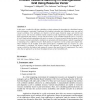Free Online Productivity Tools
i2Speak
i2Symbol
i2OCR
iTex2Img
iWeb2Print
iWeb2Shot
i2Type
iPdf2Split
iPdf2Merge
i2Bopomofo
i2Arabic
i2Style
i2Image
i2PDF
iLatex2Rtf
Sci2ools
102
click to vote
CORR
2010
Springer
2010
Springer
Efficient Resource Matching in Heterogeneous Grid Using Resource Vector
In this paper, a method for efficient scheduling to obtain optimum job throughput in a distributed campus grid environment is presented; Traditional job schedulers determine job scheduling using user and job resource attributes. User attributes are related to current usage, historical usage, user priority and project access. Job resource attributes mainly comprise of soft requirements (compilers, libraries) and hard requirements like memory, storage and interconnect. A job scheduler dispatches jobs to a resource if a job's hard and soft requirements are met by a resource. In current scenario during execution of a job, if a resource becomes unavailable, schedulers are presented with limited options, namely re-queuing job or migrating job to a different resource. Both options are expensive in terms of data and compute time. These situations can be avoided, if the often ignored factor, availability time of a resource in a grid environment is considered. We propose resource rank appr...
CORR 2010 | Education | Job Resource | Job Scheduler | Resources |
Related Content
| Added | 09 Dec 2010 |
| Updated | 09 Dec 2010 |
| Type | Journal |
| Year | 2010 |
| Where | CORR |
| Authors | Srirangam V. Addepallil, Per Andersen, George L. Barnes |
Comments (0)

